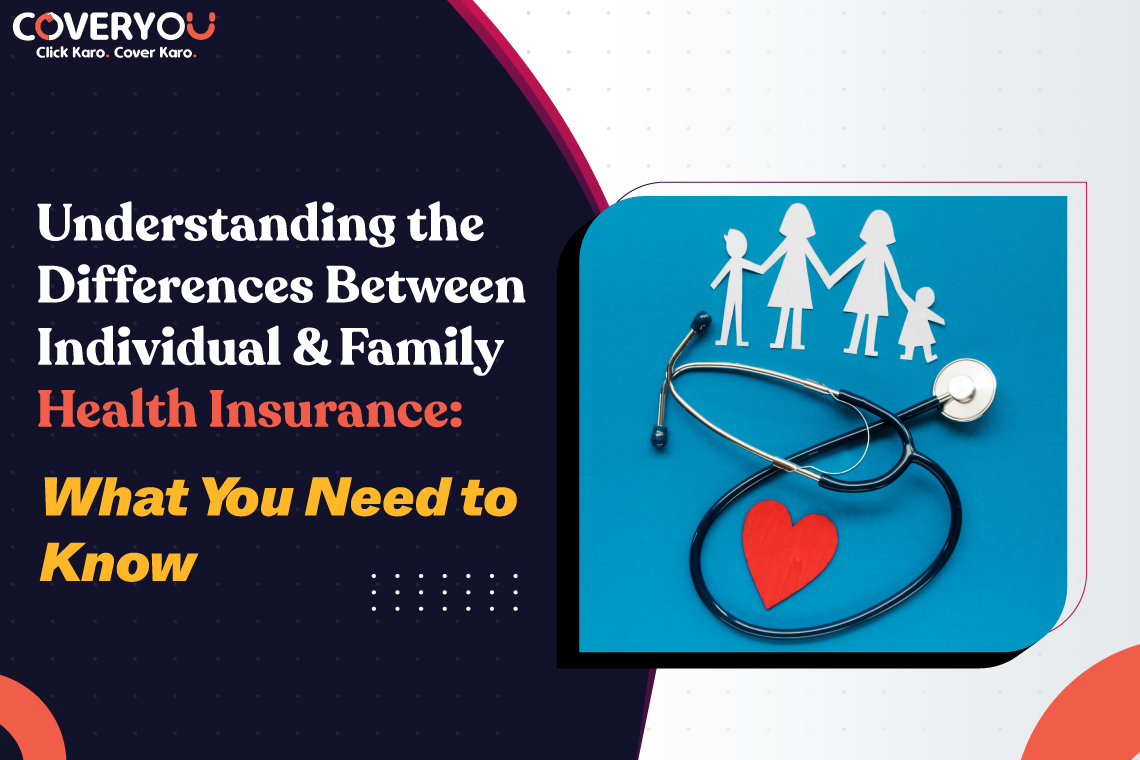The right choice of health insurance plan protects a person from medical expenses, and it also makes sure that his or her family is also well-insured. There are basically two major categories of health insurance policies: individual and family health plans. Each of these caters to various requirements and different situations. Knowing how they differ, their benefits, and considerations will give you a more decided advantage in making a choice that will go well with your health needs and your pocket.
Introduction
Health Insurance is extremely crucial in managing healthcare costs, covering treatments, hospitalisation, and many other health services. There are two major options by which individuals and families can be adequately covered: individual and family health insurance plans. This guide focuses on the key differences between these plans, therefore, helping you to determine which option best meets your needs.
-
Scope of Coverage
Individual Health Insurance:
- Single-Coverage: Individual health insurance plans are designed for individual coverage. Such a type of insurance plan is best suited for those people who have no dependents or whose family members are adequately covered by other health insurance policies.
- Personalised: This provides customised options for coverage as per the needs and wants of healthcare necessities for the concerned individual.
- Flexibility: It allows an individual to choose various coverage limits, deductibles, and optional benefits as per his needs.
Family Health Insurance:
- Multiple Dependent Coverage: Family health insurance plans would provide coverage to the spouse, children, and, at times, other dependents of the policyholder.
- Better Coverage: Family health insurance plans cover all the members of a family comprehensively under a single policy.
- Cost-Effective: Waterproofing often proves more cost-effective than buying separate individual plans for all the family members brings about consolidation in premiums and deductibles.
-
Cost Considerations
Individual Health Insurance:
- Premiums: Compared to family plans, the premium rates are usually lower because coverage is available for a single individual only.
- Deductibles and Out-of-Pocket Costs: Level of coverage for both deductibles and out-of-pocket costs is individually insured-dependent, as this part depends on the chosen plan.
- Affordability: People who don’t have dependents or whose family members are otherwise insured can find the plan quite affordable.
Family Health Insurance:
- Premiums: Family health insurance premiums are higher than that of an individual since it covers more than one member of the family.
- Cost Savings: The possibility of saving on cost since, in family health insurance, only one policy is paying for the coverage instead of several individual plans.
- Predictable Costs: Provides a long-term outlook on healthcare costs with shared deductibles and out-of-pocket maximums across the family.
-
Flexibility in Coverage
Individual Health Insurance:
- Personal Choices of Coverage: One can choose the right coverage that costs reasonably to meet the individual needs regarding health and budget.
- Portability: He or she still retains the same kind of coverage even if he or she is declared redundant or in another case where he or she has shifted elsewhere. This ensures continuity.
Family Health Insurance:
- All-Round Protection: The policies in this regard ensure that every member of a family is covered under uniform management in health insurance.
- Dependent Coverage: This prolongs coverage to dependents, such as spouses and children, under one policy.
-
Eligibility and Enrollment
Individual Health Insurance:
- Single Applicant: Only one applicant has to apply and clear the underwriting requirement for qualification of the same.
- Flexible Enrollment: The timings of enrollment are not made compulsory. For example, the employees need not enrol during specific enrollment periods only, it depends on the local regulations.
Family Health Insurance:
- Multiple Applicants: In this case, all the family members need to apply for the policy under one application form and satisfy the eligibility criteria.
- Open Enrollment: Generally, this is the time of the year when open enrollment is opened for a certain period of time for enrolling or changing coverage. It typically occurs once every year and families can enrol or change their coverage during this period.
-
Things to Consider for Families
Private Health Insurance Coverage:
- Limited Family Coverage: This coverage is not suitable for families with multiple dependents that require full health care coverage.
- Cost: It will be cheaper for families to purchase separate personal plans for adults and other plans for children when necessary.
Family Health Insurance
- Comprehensive Care: Ensures that all members of your family avail of uniform health care coverage, including preventive care, visits to specialists, and hospitalisation.
- Streamlined Administration: Assist in managing healthcare needs for all in the family in one policy, streamlining thereby the administrative tasks and healthcare management.
Conclusion
Your decision to purchase individual or family health insurance may boil down to your personal situation, entailing family size, health care needs, and budget. There are individual plans designed to offer the user personalised coverage for a single individual and family plans designed to offer comprehensive coverage for more than one dependent on any given policy. The areas in which the plans differ slightly include differences in coverage scope, costs, flexibility, eligibility, and family needs.

















